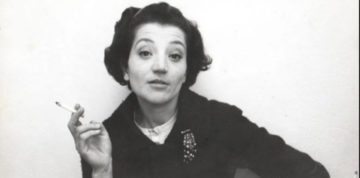 Jessica Boyall in Sidecar:
Jessica Boyall in Sidecar:
Cecilia Mangini, who died on 21 January this year, is widely credited as Italy’s first female documentary filmmaker, though she was also a photographer, critic and activist. Her career, which spanned over six decades, followed a sinuous path. Born in the Southern region of Puglia in 1927, Mangini moved to Florence at the age of six after her father’s leather business collapsed. She studied political science at the University of Florence and upon graduating took up a secretarial role at the Italian Federation of Independent Cinema in Rome, where she began writing film reviews for Cinema Nuovo, Cinema ’60 and L’Eco del Cinema. From there she turned her hand to documentary filmmaking – an arena in which she was critically acclaimed, if never famed.
Living through the fascist era and the Years of Lead, Mangini’s turbulent political context shaped the political impulses – primarily Marxist and feminist – which unite her eclectic body of work, pulsating through her studies of the Vietnam War, the life of Antonio Gramsci, the rise of the European far-right and the traditional shamanic practices in Apulia. Paradoxically, though not unusually, Mangini’s first forays into filmmaking were via the ‘Cineguf’ group: a fascist student film club attended by a number of leftist avant-garde directors – including Pier Paolo Pasolini and Antonio Ghirelli – in the early stages of their career. Like them, Mangini quickly shrugged off her reactionary affiliations, working with Pasolini and Lino Del Fra (the Roman director whom she would later marry) on several militant cinematic treatments of postbellum Italy.
More here.
